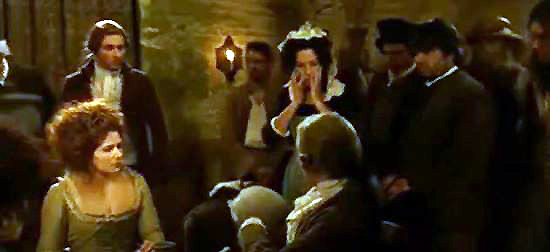Madame la Duchesse de Tourzel,
governess of the royal children, ed. 1986; Le Roi s'enfuit, French ed. of When the King Took Flight by Timothy Tackett, 2003.Televised popularizations: L'Évasion de Louis XVI, 2013 and the Varennes episode in The Rest is History, YouTube, based on Tackett.
Louis's failed "Flight to Varennes" (the insignificant border town where he is stopped) destroyed the aura of the 1500-year-old monarchy and is considered as important as taking the Bastille.
"A galloping horseman rides up behind them, cries, 'On the order of the Nation, postilion, stop! You are driving the king!' All remain stupefied."
 |
Zoom |
- The trip is put off several times, the last to coincide with the day off of a servant thought to be a spy.*
*« Placed near the queen at the time of her marriage, Her Majesty, accustomed to her, liked her skill and intelligence. She was treated in a way better than should have been that of a woman of her class. » (Bold added: the remark may explain the servant's animosity).
-- Madame Campan, p. 340
- The change means that hundreds of royalist troops sent from the frontier to escort the king stay in the region much longer than the few hours originally planned. The population fears that they announce invasion.
- The king disguises himself as "Monsieur Durand," a name as familiar in France as "Mr. Jones" in English. He poses as the accountant of a baroness whom the Dauphin's governess impersonates.
The photos on this page and the next are from L'Évasion de Louis XVI , a television movie by Viktor Lazarevski, 2013.
- Louis does not try to hide his identity as he travels through the countryside. At the relays he chats with locals and has a guard distribute largesse:
"Look! I've been given a gold louis!"
"A louis for giving directions? That's impossible!"
- Delays in leaving Paris and the coach's weight mean that the fugitives are three hours late for the meeting with the escort. Alarmed by the unrest that the troops' presence causes and supposing that the trip has been put off once more, the commander orders departure half an hour before the royals appear.
- Finding that the men have dismounted and that many are fraternizing with locals in the taverns, they go on alone.
- Jean Drouet, the vehement Jacobin who owns the relay at Sainte-Menehould, recognizes Louis while changing the horses. After persuading the notables to let him stop the king, he takes shortcuts to reach Varenne a few minutes after the royals.
- At 23:00 everyone sleeps, except for a half-dozen men who drink in a tavern. At Drouet's passionate demand they barricade the route.
- The mayor is the deputy to Paris. The grocer who replaces him wants to see how things evolve, and tells the travellers that night-time travel is dangerous and to stay in the rooms over his shop until morning. With the road still blocked, they have to accept.
"Bonjour Sire!" When a resident who has been to Versailles confirms the stranger's identity, Louis admits that he is the king:
- Drouet has the church bell toll. "The bells in the village churches took up the call. The whole shadowy countryside was in commotion; from the steeple one could see lights that sought each other, came together; a great storm was forming; a mass of armed men, full of agitation, trouble."
- Populations stream into Varennes with drum rolls, banners, pikes and guns. Two representatives from the government arrive, with a letter that confirms the king's flight and an order to keep him from going farther. The crowd demands that he be taken back to Paris.
- Louis tries to delay the departure, hoping that the royalist troops on the border only 20 miles away, will free him...
.JPG)
-- Michelet, p.171.
When they reach Varennes the king has gone. The cloud of dust the crowd has left still hovers over the route.
They leave.
# # #
- Local guards and people by the tens of thousands relay to surround the coach. It can advance only step by step. The return takes four days.
- At Chalons, a town with little commercial production and so without radical workers, notables receive the royals ceremoniously. On the fourth night since leaving Paris, everyone sleeps at last.
- The respite is short-lived: Crowds from Reims stop a mass. A count arrives on horseback wearing the Cross of Saint Louis, cries "Long live the king!"and is massacred. His head and hat are brandished on pikes.
- Three emissaries from the National Assembly arrive to preserve order and the procession moves on.
- Crowds near Paris are even more hostile.
Retour de la famille royale à Paris après sa fuite à Varennes en 1791, anonymous engraving / zoom
- But when Jean Drouet* appears at the head of the cortege applause breaks out.
- As delegate to the radical government elected a year later, he votes the death of the king.
- He fights against Austria, is captured and is among the prisoners exchanged for Louis's young daughter.
- He becomes sub-prefect of Sainte-Menehould.
- Napoleon decorates him, saying "You have changed the face of the world."
- Restoration authorities pursue him and he ends his life in hiding.
Retour du Roi et de sa famille après la fuite à Varennes, unidentified print / zoom
The crowd lets the royals enter the Tuileries palace, but only the action of the National Guard (the Paris militia) saves the guards from massacre.
When Marie-Antoinette looks in a mirror she sees that her blond hair has turned white.
La Famille des cochons ramenée à l'étable ("The Family of Pigs Returned to the Stable"), anonymous print / zoom

.jpg)






.jpg)





No comments:
Post a Comment